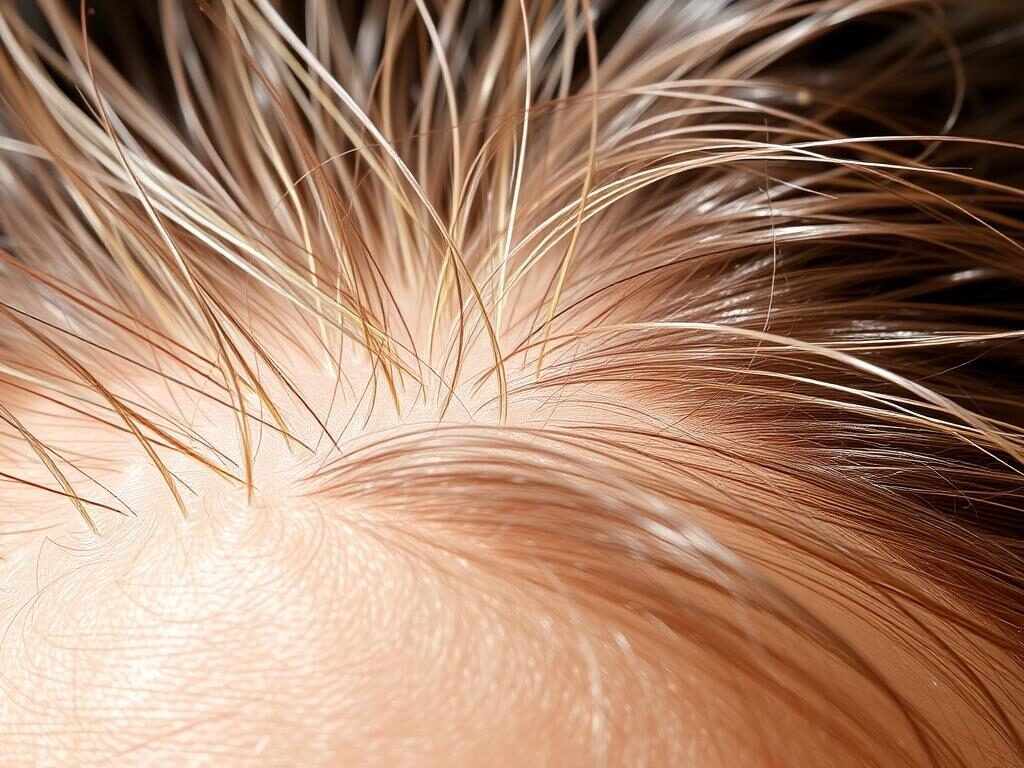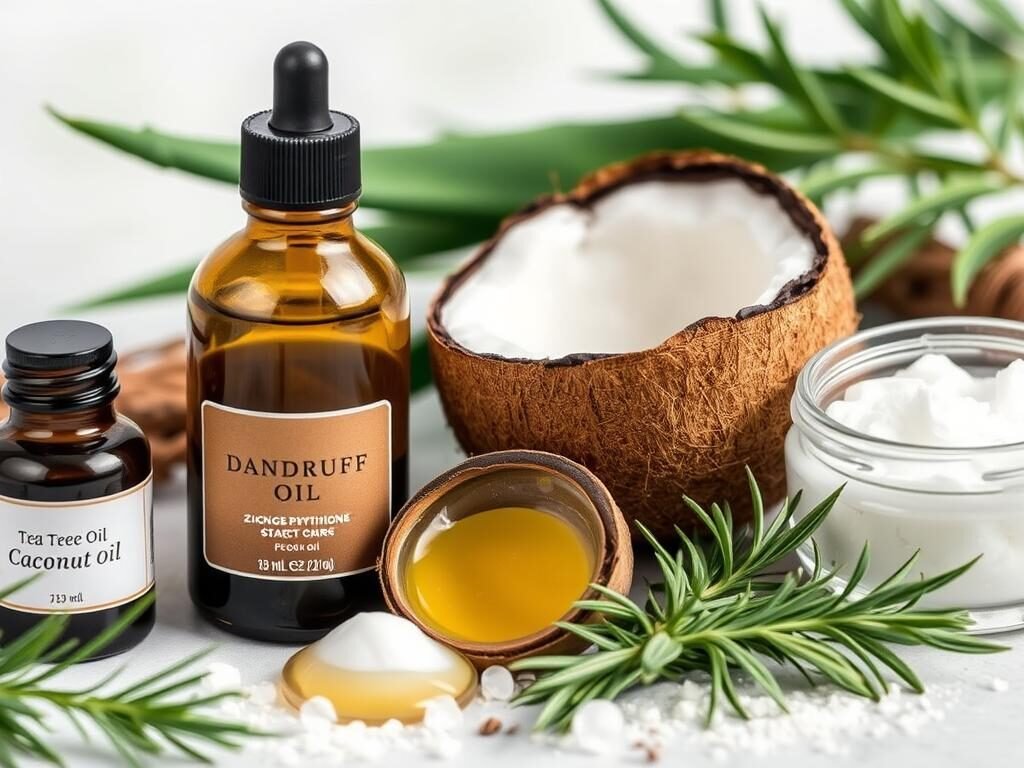Do you struggle with unsightly flakes and thinning strands? If so, you’re not alone. Millions of people worldwide grapple with the frustrating combination of dandruff and hair loss. But what if there was a simple solution to address both of these common hair woes? In this comprehensive guide, we’ll uncover the best shampoos that can effectively tackle dandruff and hair fall, empowering you to achieve the healthy, vibrant locks you deserve.
 Key Takeaways
Key Takeaways
- Discover the root causes of dandruff and hair loss for a better understanding of your hair’s needs
- Explore the key ingredients that combat both dandruff and hair fall for maximum efficacy
- Gain insights into prescription-strength, over-the-counter, and natural shampoo options to find the right fit
- Learn proper application techniques to ensure you get the most out of your anti-dandruff and hair loss shampoo
- Discover complementary hair care practices that can enhance the benefits of your targeted shampoo
Ready to say goodbye to flaky scalps and thinning hair for good? Let’s dive in and uncover the best shampoo for dandruff and hair fall that will transform your hair from drab to fab in 2024.
Understanding Dandruff and Hair Fall: Causes and Symptoms
Dandruff and hair fall are common scalp issues that affect our hair health. Knowing the causes and their link to scalp health is key to solving these problems.
Common Triggers of Dandruff
Dandruff is often due to an overgrowth of *Malassezia*, a fungus on the scalp. Several factors can lead to this fungus growing too much:
- Excess oil on the scalp
- Dry skin conditions like eczema or psoriasis
- Sensitivity to hair care products
- Hormonal imbalances
- Stress and a weak immune system
Why Hair Fall Occurs
Hair fall can be caused by many things, including:
- Hormonal changes: Changes in hormones like thyroid, estrogen, and testosterone can affect hair growth.
- Nutritional deficiencies: Not getting enough vitamins, minerals, and proteins can cause thinning hair.
- Stress and illness: High stress and some illnesses can lead to hair loss.
- Hairstyles and treatments: Using too much heat, chemicals, and tight hairstyles can damage hair and scalp.
The Connection Between Scalp Health and Hair Loss
Scalp health is vital for hair growth and retention. Dandruff, caused by *Malassezia* fungi, can irritate the scalp and disrupt hair growth. Ingredients like ketoconazole and selenium sulfide in anti-dandruff shampoos help control this fungus. They promote a healthier scalp for hair to grow well.

“Maintaining a healthy scalp is the foundation for healthy, strong hair.”
Key Ingredients That Combat Both Dandruff and Hair Loss
Some ingredients are great at fighting dandruff and hair loss. Let’s look at the science behind zinc pyrithione, tea tree oil, and salicylic acid.
Zinc Pyrithione is good at stopping dandruff at its source. It slows down the fungus Malassezia that causes flaky scalps. It also reduces inflammation, helping your scalp stay healthy for hair growth.
Tea Tree Oil is a natural hero for hair and scalp. It fights fungal growth and soothes the scalp. It also boosts blood flow to the scalp, nourishing hair follicles.
Salicylic Acid is a chemical exfoliant that fights dandruff. It gently removes dead skin and debris from hair follicles. This keeps the scalp clean for new hair growth.

“The synergistic action of these three ingredients – zinc pyrithione, tea tree oil, and salicylic acid – makes them a formidable trio in the battle against both dandruff and hair loss.”
Using shampoos with these ingredients can help with scalp health and hair thinning. This leads to a healthier, happier head of hair.
Best Shampoo for Dandruff and Hair Fall
Dealing with dandruff and hair loss can be tough. But the right shampoo can help a lot. We’ve found the best shampoos for these common problems. Whether you need a strong formula, something you can buy over the counter, or a natural option, we’ve got you covered.
Prescription-Strength Options
For tough dandruff or serious hair loss, try shampoos with ketoconazole. These strong formulas aim to fix the root of the problem. They help your hair grow back healthier.
Over-the-Counter Solutions
Looking for an anti-dandruff shampoo at your local store? There are many good ones out there. Look for shampoos with zinc pyrithione, selenium sulfide, or coal tar. These ingredients fight dandruff and help your hair stay healthy.
Natural and Organic Alternatives
Want a gentler option? Try natural and organic hair loss treatment shampoos. They often have tea tree oil, rosemary, or biotin. These ingredients are good for your scalp and hair without harsh chemicals.
Choosing the right shampoo is key to solving scalp and hair problems. By picking the right one, you can make your hair healthier and dandruff-free. Start using the right shampoo to see a big difference in your hair.
How to Choose the Right Anti-Dandruff Shampoo for Your Scalp Type
Finding the right anti-dandruff shampoo can change your scalp health and hair care. Knowing your scalp type and the best ingredients is key.
If you have a dry, flaky scalp, look for shampoos with selenium sulfide or zinc pyrithione. These ingredients fight dandruff by controlling the fungus that causes flakes.
For an oily scalp, choose shampoos with salicylic acid. It controls oil and removes dead skin cells. Adding tea tree oil helps soothe and clarify.
If your scalp is sensitive, avoid harsh sulfates. Go for sulfate-free shampoos. Ingredients like aloe vera or chamomile soothe and nourish.
“Choosing the right anti-dandruff shampoo is crucial for maintaining a healthy, flake-free scalp and promoting strong, vibrant hair growth.”
Every scalp and hair type is different. Experiment to find the best shampoo for you. The right scalp health solution can end dandruff and bring you beautiful, nourished hair.
Proper Application Techniques for Maximum Benefits
To get the most out of your anti-dandruff and hair fall shampoo, it’s essential to follow the right application techniques. From the frequency of use to scalp massage methods and post-wash care tips, these small adjustments can significantly enhance the effectiveness of ingredients like tea tree oil and salicylic acid in improving your scalp health.
Frequency of Use
The optimal frequency for using an anti-dandruff shampoo can vary depending on the severity of your condition. For mild to moderate dandruff, using the shampoo 2-3 times per week is generally recommended. However, if you have a more stubborn case, you may need to use it daily until the symptoms subside, then transition to a maintenance routine of 2-3 times per week.
Massage Methods
Gently massaging the scalp during shampooing can help enhance the penetration of active ingredients, leading to better results. Using your fingertips, apply light, circular motions to the entire scalp, focusing on areas prone to flakiness or excess oil. This gentle massage stimulates blood flow and ensures the shampoo effectively reaches the roots.
Post-Wash Care Tips
- Avoid vigorously towel-drying your hair, as this can further irritate the scalp. Instead, gently pat or squeeze excess moisture.
- Consider using a leave-in treatment or serum containing tea tree oil or salicylic acid to continue nourishing the scalp between washes.
- Limit the use of heat styling tools, as they can exacerbate dryness and flakiness.
By incorporating these simple yet impactful techniques into your hair care routine, you’ll be well on your way to achieving a healthier, more vibrant scalp and minimizing both dandruff and hair fall.
“Consistency is key when it comes to managing scalp issues. Stick to your routine and be patient – it may take a few weeks to see noticeable improvements.”
Complementary Hair Care Practices for Better Results
To get the most out of your anti-dandruff and hair fall shampoo, add some extra hair care steps. A complete approach that looks at scalp health and hair wellness boosts your shampoo’s power. This leads to lasting, good results.
Eating well, with foods full of biotin, iron, and zinc, helps your hair grow strong and less likely to fall out. Also, stress management through meditation or yoga helps your scalp and hair. Stress is a big reason for too much hair loss.
Good hair care, like gentle brushing and avoiding too much heat styling, helps your scalp and keeps your hair from breaking. Using these practices with your shampoo makes your hair and scalp healthier. This creates a better environment for treating hair loss and improving scalp health.

Add a Comment